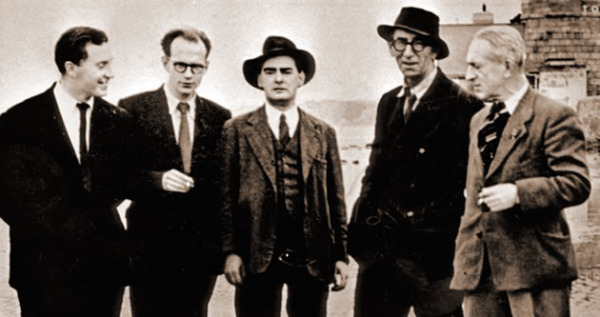The first Bloomsday was a walk through Dublin, stopping at the various landmarks visited by Leopold Bloom and Stephen Dedalus. It was organized by two men - John Ryan, a central figure in the Dublin literary scene as an organizer, booster, and tastemaker, and Brian O’Nolan, better known to history as Flann O’Brien.
Who is Flann O’Brien? Probably the greatest Irish writer almost entirely unknown outside of Ireland itself - an early postmodernist and a savage critic of Irish culture’s self-mythologizing tendencies. In the most straightforward of his books, the Irish-language The Poor Mouth (An Béal Bocht), no sacred cliche of the Gaelic Renaissance is left unskewered; in the protagonists’ hometown of Corkadoragha, the suffering of the Gaelic people is so wretched and unmitigated it drives even those searching for an authentic Gaelic experience away.
not until James Joyce came along has anybody so considerably evoked depravity to establish the unextinguishable goodness of what is good.
Joyce was in no way what he is internationally claimed to be—a Dubliner. In fact there has been no more spectacular non-Dubliner…. Joyce was a bad writer. He was too skilled in some departments of writing, and could not resist the tour de force. Parts of “Ulysses” are of unreadable boredom…. Joyce was illiterate. He had a fabulously developed jackdaw talent of picking up bits and pieces, but it seems his net was too wide to justify getting a few kids’ schoolbooks and learning the rudiments of a new language correctly.

Do you need to know any of this to enjoy the day? Not in the least. But it might help given the tendency among Joyce’s great admirers, myself included, to make a big fuss over it. I sometimes worry that the hullaballo over Joyce’s greatness makes his work seem even less accessible, more the specialized province of a literati clique, recognizing each other from their stooped shoulders and over-elaborate puns. If you feel intimidated by the cult of Joyce, it can a useful remedy to remember that from the beginning, the idea of a Bloomsday celebration was shaped by people who saw Joyce as fallible, even mockable, and who were skeptical of his fame. People who also saw it as much as an excuse to climb the Martello tower and drink and sing songs as to read the book — which I think Joyce himself, long dead by then, might have approved of.
O’Brien, in the piece quoted above, notes “the utterly ignored fact that Joyce was among the most comic writers who have ever lived.” It’s a fact still often ignored today; partially so that we can bask in the achievement of having conquered Ulysses like some lit-nerd Everest. Comedy doesn’t sit easily with reverence - if it did, perhaps we’d have an International Wodehouse day as well. But I’d encourage you all to remember to take your Bloomsdays unseriously, and skeptically, and possibly also with a pint of plain. Flann O’Brien would have wanted it that way.
